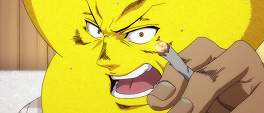Perhaps a reflection of a troubled production or the lack of faith placed in the source material, but the opening episodes of Arakwa Under the Bridge are supremely underwhelming. Individual components of the prototypical SHAFT show are all present - the reliance on abstract close ups and over-coloured backgrounds, the ponderous and circular script, the abjectly peculiar concept - however here they've all been weathered by time and overuse and sit bluntly against one another. Without a strong story to carry it, the show is forced to rely upon a script which is bereft of the sharp writing past series have been known for. Only memories of past glories and faith in the studio's ability will determine how much one can both stomach the lacklustre start and how long one can wait for the series to hit its stride.
After an unfortunate incident with some hoodlums and a faulty bridge support, Kou Ichinomiya finds himself sinking to the bottom of a river. He is saved by Nino, a local blonde waif; unfortunately the mantra of his life is to never be in a position to owe anyone anything, this is how he came to live under the bridge with Nino and a cavalcade of eccentric characters. This includes the mayor of the riverbank - a man dressed in a full body kappa suit - a belligerent man with a face in the shape and colour of a star and a man who can only walk on white lines, making the trip down from Hokkaido using a linesman's marking machine. This is to say nothing of Nino herself who claims to be from Venus and demonstrates only a fleeting grasp of common sense. Kou's decision to live under the bridge could, for better or worse, entirely undermine his privileged upbringing.
Attempting to get to the core of the series in the first three episodes is fraught with trouble. As a comedy it lacks the critical mass to sustain itself and only the introduction of the Sister in episode two is enough to raise a chuckle, other characters lack charisma on their own and chemistry together to make up the deficit. Vast swathes of tedious dialogue are thrown haphazardly about the staccato episodes resulting in a brutally low signal to noise ratio; without the wry wit of early episodes of Sayonara Zetsubou Sensei or even the biting cynicism of Bakemonogatari there is nothing to fall back on. A criminal shame when the vocal cast is so strong, instead forced to revert to prior characters rather than jump into the skin of brand new ones - Maaya Sakamoto channels Shiki from Kara no Kyoukai and sounds more like a little boy than ever, Hiroshi Kamiya screams Itoshki while even Tomokazu Sugita summons up Kyon from Haruhi despite wildly different characters.
As a romance the series also doesn't show any promise, the possibility of the capricious, obtuse Nino and the sheltered, twitchy Kou developing a mutual affection for each other seems incredibly far-fetched. Similarly as a tale of transforming the disbelieving and intolerant Kou into someone fit to inherit his insane father's company is difficult to stomach. This doesn't mean other avenues aren't available for the series to grow into but after frittering away a quarter of it with little indication of direction, the likelihood of, for instance, the charming misadventures of the outlandish river folk being satisfying is slim. The most egregious problem is that weirdness seems to be present for its own sake, at the end of three episodes there isn't a contextual justification for the ongoing zaniness; even an indication that this is part of a fever dream as Kou sinks to the bottom of the river rather than dreading the next oddly shaped head to appear would be better.
Arakawa Under the Bridge isn't lacking directorial control, Akiyuki Shinbo still brands his works with familiar flair, but whether it is the nature of the source material or its interpretation the problem lies in the lack of focus. Ignoring the uncharacteristically choppy animation and the poor ROUND TABLE / Nino-esque opening, the initial three episodes skitter between ruthlessly short scenes with little care for the grander narrative pace or enjoyment. A panoply of different talents aligned to produce this series and with SHAFT at the helm there is a strong possibility it will find its footing after its languid start, but the evidence so far makes this far from assured.







